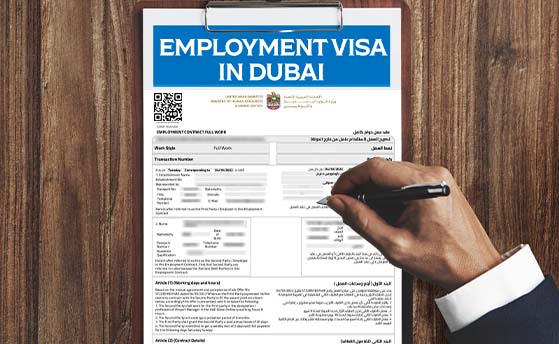What are the requirements for an employment visa in Dubai?
Here are the key prerequisites for obtaining an employment visa in Dubai:

-
Valid Job Offer:
You need a confirmed job offer from a company registered in Dubai or any of the free zones. The offer should be in line with the labor laws and regulations of the United Arab Emirates (UAE).
-
Employment Contract:
A comprehensive employment contract stating your job title, responsibilities, salary, benefits, and working hours is mandatory. Both you and your employer must sign the employment contract as a requirement for the employment visa in Dubai.
-
Passport:
You must possess a valid passport with a minimum validity of six months. Make sure your passport has at least two blank pages for visa stamping.
-
Medical Fitness Certificate:
Before applying for an employment visa, you must undergo medical tests to obtain a fitness certificate. This typically includes a blood test, a chest X-ray, and screening for infectious diseases like HIV, tuberculosis, and hepatitis.
-
Attestation of Degree Certificate
or Professional Qualifications: Depending on the job position, you might need to provide attested copies of your educational certificates and professional qualifications. These documents should be verified and authenticated by the relevant authorities or embassies.
-
Visa Application Process:
Your employer, acting as your sponsor, will initiate the visa application process through the Ministry of Human Resources and Emiratisation (MOHRE) or the relevant free zone authority. You will need to provide all necessary documents, including the job offer, employment contract, passport copy, medical fitness certificate, and educational qualifications.
-
Emirates ID Card:
Once you arrive in Dubai, you must apply for an Emirates ID card. This card serves as your official identification within the UAE and is required for various official transactions.
-
Residence Visa:
After entering Dubai on an employment visa, your employer or the free zone authority will initiate the process for your residence visa. This involves additional paperwork, medical tests, and obtaining a residence permit.
It is crucial to note that visa regulations may vary depending on factors such as nationality, job position, and the specific free zone where your employer is located. Therefore, it is advisable to consult with the appropriate authorities or seek legal advice to ensure compliance with the latest regulations and procedures.





